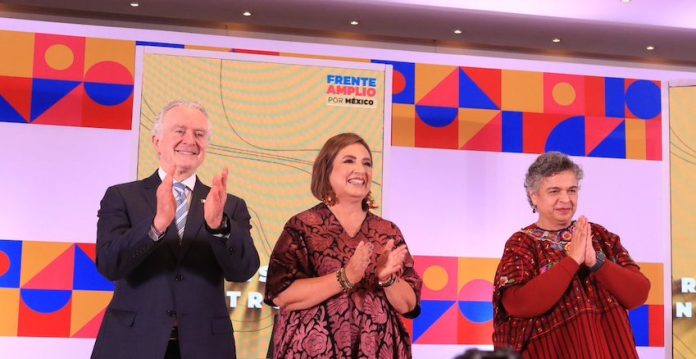Senator Xóchitl Gálvez’s assertion that she has “the ovaries” to combat crime was perhaps the most memorable remark during a forum in Durango on Thursday at which security was a key focus of the three aspirants to the Broad Front for Mexico’s presidential election nomination.
Senator Beatriz Paredes of the Institutional Revolutionary Party (PRI) and Santiago Creel, a former National Action Party (PAN) lawmaker and ex-interior minister, joined PAN Senator Gálvez for the first “regional forum” of the third and final stage of the three-party opposition bloc’s process to select its candidate for the June 2, 2024, presidential election.
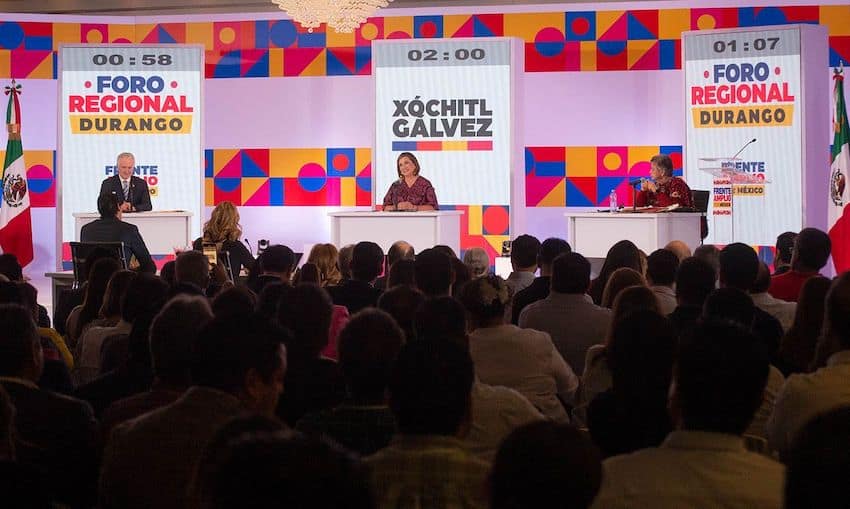
The Democratic Revolution Party (PRD) is also part of the Broad Front for Mexico (FAM) alliance, but none of its representatives passed the first stage of the candidate selection process.
Gálvez, who polls show is the leading FAM aspirant, accused President López Obrador of complicity with organized crime during her opening remarks at the Durango city event.
Mexico deserves to be a country “where young people can go out to the street without feeling afraid” and where the government is made up of “honest and capable public servants” instead of the “corrupt and inept” ones currently in office, she declared.
Gálvez asserted that the federal government’s non-confrontational “hugs, not bullets” approach to security is not a strategy but rather a poorly thought out idea of the president.
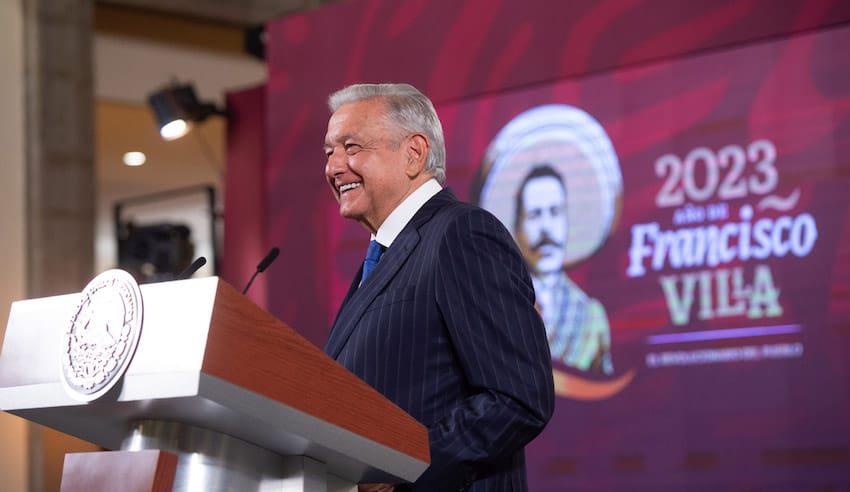
“Intelligence, heart and firmness” are needed to combat crime, said the senator, who backed a civilian National Guard rather than the militarized one created by the current government.
“Intelligence to form the best team of national and international specialists, very clear measures against crime, indicators that allow us to evaluate results and above all the use of state-of-the-art technology,” she said.
“Heart so that we put ourselves on the side of the victims and not criminals … [and] firmness in applying the law. We have to return peace and tranquility to Mexicans,” Gálvez said.
“I’ve said it very clearly. I have the ovaries to combat criminals,” she added.

Paredes, who placed second behind Gálvez in polling conducted during the second stage of the FAM candidate selection process, also advocated a change in security policy. The change, she said, is needed now because without one over 25,000 more people will be dead by October 2024, when Mexico’s next president will be sworn in.
“From Lagos de Moreno, five young ghosts demand that we raise our voices and demand justice,” the PRI senator said, referring to the five young men who were abducted and presumably murdered in Jalisco late last week.
Paredes proposed increasing security funds for states and municipalities and the creation of a Ministry of Justice. She also advocated a “great national agreement” aimed at guaranteeing the rule of law across Mexico, parts of which are still plagued by collusion between authorities and criminals.
Creel asserted that López Obrador leads a “government of death” given that over 160,000 homicides have been recorded since he took office, more than in any other presidential term in recent history.
“When we talk about [homicide] numbers we tend to see things coldly and I don’t want to normalize that. Behind each number there is a loss of human life and infinite pain. The Broad Front for Mexico is here to avoid human pain,” he said.
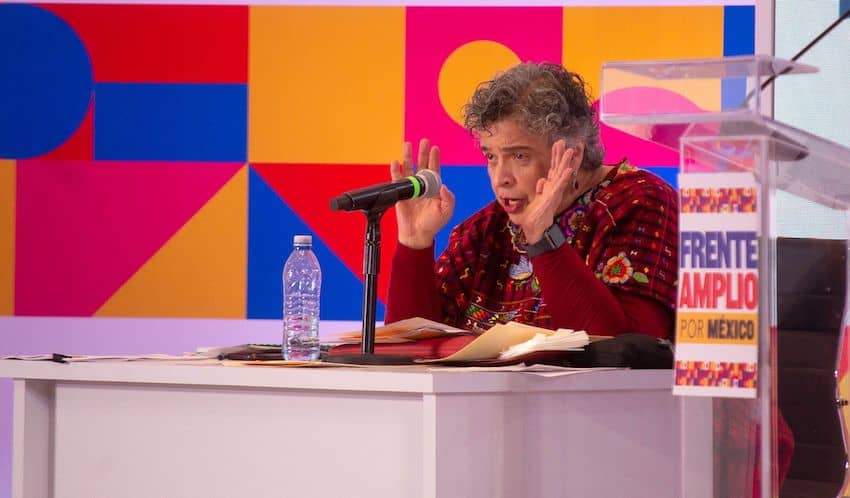
“… Impunity, corruption and insecurity are linked to the lack of the rule of law,” Creel said.
“The probability of a crime being punished in Mexico is 1%,” he said, making an apparent reference to a figure cited by the Mexican Employers Federation earlier this year.
The PAN aspirant proposed holding a regional conference at which countries of the Americas can discuss ways to combat organized crime groups, which he asserted know no borders. Countries of the region need to orient themselves in “the same direction” in the fight against crime, Creel said.
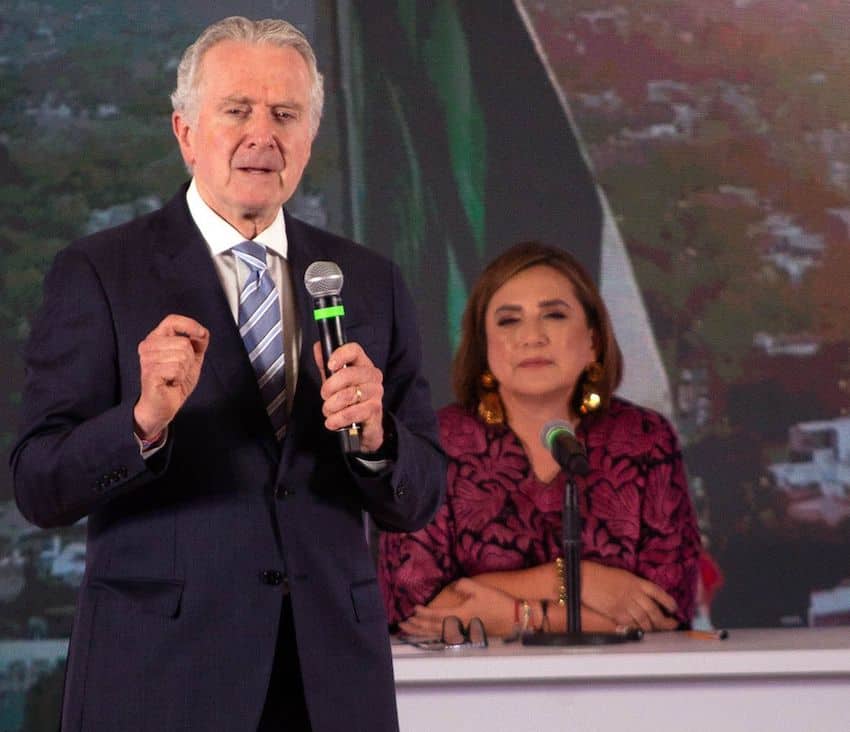
He also proposed the creation of a “specialized” police force “with an intelligence system and strategy.”
Many current officers lack training, Creel said, referring to a problem that has plagued police forces, especially municipal ones, for years.
Gálvez expressed confidence that the FAM can win next year’s presidential election, even though polls indicate that the candidate put forward by the ruling Morena party – most likely former Mexico City mayor Claudia Sheinbaum or ex-foreign affairs minister Marcelo Ebrard – will triumph.

“I’m convinced that the hope [of the people of Mexico] has changed hands,” she said.
Morena used the slogan “the hope of Mexico” in the lead-up to the 2018 presidential election, but hope “now belongs to us,” Gálvez said.
“I’ve visited 23 states and in all of them [the people] tell me: ‘Xóchitl, you’ve restored our hope.’ … To achieve the Mexico we dream of, we have to win in 2024, there’s no other option. What I come to offer you today is victory,” she said.
Gálvez, Paredes and Creel will participate in four more regional forums this month at which they will have additional opportunities to present their ideas and sell themselves to voters.
The opposition alliance backed by the PAN, the PRI, the PRD and like-minded civil society groups will announce its presidential candidate on Sept. 3 after additional polling and a direct vote in which registered citizens will cast ballots.
The winner of the two-month-long selection process will be known as the “person responsible for the construction of the Broad Front for Mexico” until 2024 candidates are officially allowed to be designated under electoral rules.
With reports from Sin Embargo, El Financiero, El Universal and Reforma
